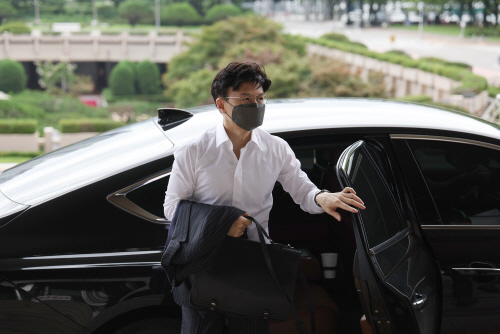 |
| Justice Minister Han Dong-hoon heads to the Government Complex Gwacheon on August 10, 2022./ Source: Yonhap |
AsiaToday reporter Kim Im-soo
The scope of corruption and economic crimes that prosecutors can directly investigate will be greatly expanded. Besides, prosecutors will be able to investigate directly some crimes, related to violations of judicial order and other offenses stipulated in individual laws, that are classified as “grave crimes”.
The move comes just one month before the prosecution reform bills, officially called revisions of the Prosecutors’ Office Act and the Criminal Procedure Act, take effect. As the revisions call for reducing the scope of the prosecution’s direct investigation right, the government is seeking to expand the prosecution’s investigative authority through a revision of an enforcement decree.
The Ministry of Justice made the announcement Thursday adding that it will issue an advance notice by August 29 on the revision of a presidential decree stipulating the scope of crimes where prosecutors can initiate investigations.
Under current law, prosecutors can directly investigate crimes that fall under the six categories, including corruption, the economy, public officials, elections, defense projects and major disasters. However, the revision set to take effect will limit their investigations to corruption and economic crimes as determined by a presidential decree.
However, the revised presidential decree allows the prosecution to investigate some of the crimes related to public officials and elections.
Some of the crimes by public officials, such as abuse of power and creation of false public documents, can be seen as typical of corruption crimes, while some election crimes, such as bribery and donations, can be also seen as corruption crimes, the ministry said.
The amendment also allows prosecutors to investigate drug trafficking, criminal organizations and voice phishing by defining them as ‘economic crimes’.
New types of organizational crimes involving large criminal proceeds, such as redevelopment corruption, ponzi and stock price manipulation, are also defined as economic crimes.
The ministry has rearranged the types of grave crimes defined by the presidential decree. In particular, it classified ‘crimes that violate judicial order’ and ‘crimes that require a prosecutor to make an accusation and investigation’ as grave crimes to be directly investigated by prosecutors.
#justice ministry #prosecutors #investigative power #presidential decree #amendment
Copyright by Asiatoday
Most Read
-
1
-
2
-
3
-
4
-
5
-
6
-
7





















